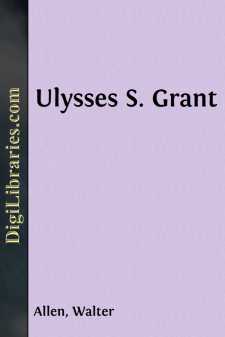Categories
- Antiques & Collectibles 13
- Architecture 36
- Art 48
- Bibles 22
- Biography & Autobiography 813
- Body, Mind & Spirit 142
- Business & Economics 28
- Children's Books 14
- Children's Fiction 11
- Computers 4
- Cooking 94
- Crafts & Hobbies 4
- Drama 346
- Education 46
- Family & Relationships 57
- Fiction 11829
- Games 19
- Gardening 17
- Health & Fitness 34
- History 1377
- House & Home 1
- Humor 147
- Juvenile Fiction 1873
- Juvenile Nonfiction 202
- Language Arts & Disciplines 88
- Law 16
- Literary Collections 686
- Literary Criticism 179
- Mathematics 13
- Medical 41
- Music 40
- Nature 179
- Non-Classifiable 1768
- Performing Arts 7
- Periodicals 1453
- Philosophy 64
- Photography 2
- Poetry 896
- Political Science 203
- Psychology 42
- Reference 154
- Religion 513
- Science 126
- Self-Help 84
- Social Science 81
- Sports & Recreation 34
- Study Aids 3
- Technology & Engineering 59
- Transportation 23
- Travel 463
- True Crime 29
Ulysses S. Grant
by: Walter Allen
Categories:
Description:
Excerpt
CHAPTER I
OUR NATIONAL MILITARY HERO
Since the end of the civil war in the United States, whoever has occasion to name the three most distinguished representatives of our national greatness is apt to name Washington, Lincoln, and Grant. General Grant is now our national military hero. Of Washington it has often been said that he was "first in war, first in peace, and first in the hearts of his countrymen." When this eulogy was wholly just the nation had been engaged in no war on a grander scale than the war for independence. That war, in the numbers engaged, in the multitude and renown of its battles, in the territory over which its campaigns were extended, in its destruction of life and waste of property, in the magnitude of the interests at stake (but not in the vital importance of the issue), was far inferior to the civil war. It happens quite naturally, as in so many other affairs in this world, that the comparative physical magnitude of the conflicts has much influence in moulding the popular estimate of the rank of the victorious commanders.
Those who think that in our civil war there were other officers in both armies who were Grant's superiors in some points of generalship will hardly dispute that, taking all in all, he was supreme among the generals on the side of the Union. He whom Sherman, Sheridan, Thomas, and Meade saw promoted to be their commander, not only without envy, but with high gratification, under whom they all served with cordial confidence and enthusiasm, cannot have been esteemed by them unfit for the distinction. If these great soldiers then and always acclaimed him worthy to be their leader, it is unbecoming for others, and especially for men who are not soldiers, to contradict their judgment.
Whether he was a greater soldier than General Robert E. Lee, the commander-in-chief of the army of the Confederate States, is a question on which there may always be two opinions. As time passes, and the passions of the war expire, it may be that wise students of military history, weighing the achievements of each under the conditions imposed, will decide that in some respects Lee was Grant's superior in mastery of the art of war. Whether or not this comes about, Lee can never supplant Grant as our national military hero. He fought to destroy the Union, not to save it, and in the end he was beaten by General Grant. However much men may praise the personal virtues and the desperate achievements of the great warrior of the revolt against the Union, they cannot conceal that he was the defeated leader of a lost cause, a cause which, in the chastened judgment of coming time, will appear to all men, as even now it does to most dispassionate patriots, well and fortunately lost.
In the story of Grant's life some things must be told that are not at all heroic. Much as it might be wished that he had been what Carlyle says a hero should be, a hero at all points, he was not a worshipful hero. Like ourselves all, he was a combination of qualities good and not good. The lesson and encouragement of his life are that in spite of weaknesses which at one time seemed to have doomed him to failure and oblivion, he so mastered himself upon opportune occasion that he was able to prove his power to command great and intelligent armies fighting in a right cause, to obtain the confidence of Lincoln and of his loyal countrymen, and to secure a fame as noble and enduring as any that has been won with the sword.
This hero of ours was of an excellent ancestry. Until lately, most Americans have been careless of preserving their family records. That they were Americans and of a respectable line, if not a distinguished one, for two or three generations back, was as much of family history as interested them, and all they really knew....


